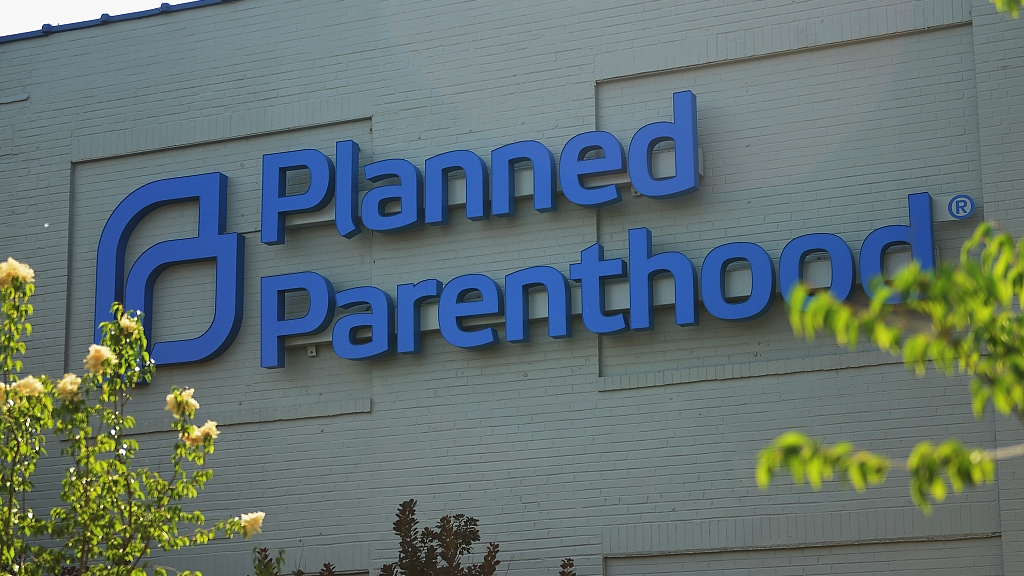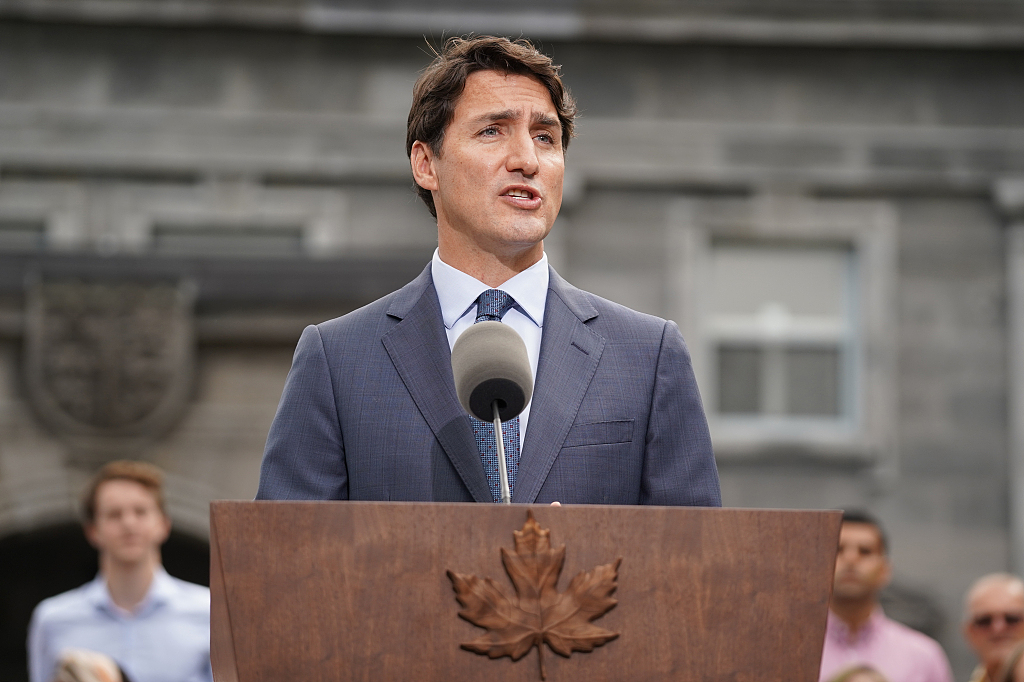

Editor's note: Esenam Amuzu, a member of the Women Deliver Young Leader class of 2018 and the Youth Advisory Board of the Ghana SRHR Alliance for Young People, is an SRHR activist and founder of the My Teen Life project. The article reflects the author's opinions, and not necessarily the views of CGTN.
Planned Parenthood, a vital source of sexual and reproductive health services in the United States, has just been forced to withdraw from the federal Title X family-planning program, which supports low-income women.
The decision, a response to a new rule by U.S. President Donald Trump’s administration forbidding Title X clinics from referring patients for abortions, will cost Planned Parenthood about 60 million U.S. dollars annually.
That loss may be dwarfed by the human costs of infringing on sexual and reproductive health and rights (SRHR) by withholding crucial medical information from patients.
Still, losing the Title X funding, which would have been used for contraceptives, screenings for cervical and breast cancer and sexually transmitted infections (STIs), and other essential health services, is a damaging blow.
And yet Planned Parenthood is not alone: organizations protecting SRHR all over the world are facing similar, if not more severe, financing constraints.
The international community knows that SRHR has far-reaching implications for human health and development, including education, poverty reduction, and gender equality. This is reflected in the United Nations Sustainable Development Goals, adopted by world leaders in 2015, which include the target of ensuring universal access to sexual and reproductive health services by 2030.
But without sufficient funding, this goal will remain out of reach. Overall health-service provision in lower- and middle-income countries is funded largely by donors, and, as Pauline Irungu, the advocacy and policy country lead for Kenya at the international health nonprofit PATH, noted during this year’s Women Deliver conference, there is a large financing shortfall for family planning.
The annual funding gap just to eliminate preventable maternal, child, and adolescent deaths stands at an estimated 33 billion U.S. dollars.
Even existing funding is not guaranteed, owing to factors ranging from fluctuating exchange rates to changing political agendas. The Trump administration has offered a stark demonstration of just how vulnerable this leaves countries.
Almost immediately upon taking office, Trump reinstated the so-called global gag rule – officially called the Mexico City Policy, which blocks U.S. federal funding for any non-governmental organization that provides abortion counseling or referrals or advocates for domestic abortion rights.

Whole Woman's Health, a clinic, provides reproductive healthcare for women, on June 19, 2019, in South Bend, Indiana, June 19, 2019. /VCG Photo
In punishing any organization that respects patients’ right to relevant – and potentially life-saving – medical information, the Trump administration effectively cut off millions of people not only from sexual and reproductive health services, but also unrelated services, such as for HIV/AIDS, malaria, and tuberculosis.
Not surprisingly, the global gag rule is associated with higher rates of STIs, including HIV, unsafe abortions, and preventable deaths.
The U.S. has also blocked funding to the UN Population Fund, one of the leading global providers of sexual and reproductive health services, especially in conflict areas.
The Trump administration claims – without basis – that, in its work in China, the UNFPA has violated the Kemp-Kasten Amendment. Enacted in 1985, Kemp-Kasten blocks aid to any organization that the U.S. deems to be involved in coercive practices, such as forced sterilizations.
Moreover, last year, the Trump administration pushed for the removal of the phrase “sexual and reproductive health” from annual multilateral agreements, such as at the UN Commission on the Status of Women, claiming that such language condones abortion.
Similarly, in April, the U.S. pressured Germany to water down a UN resolution aimed at preventing rape in conflict situations by removing language recognizing women’s right to reproductive health.
To undermine accountability further, it has also eliminated reproductive rights from the U.S. State Department’s annual Human Rights Reports, and quit the UN Human Rights Council.
To be sure, some donor countries are stepping up to the challenge of protecting SRHR. Citing the “devastating consequences” of the politicization of women’s rights, Canadian Prime Minister Justin Trudeau recently pledged to increase his country’s spending on women and girl’s health globally, from 1.1 billion Canadian dollars (836 million U.S. dollars) to 1.4 billion Canadian dollars (1 billion U.S. dollars) by 2023.
But it is not enough. Developing-country governments must urgently reduce their dependence on outside donors. And yet, so far, they have been slow to pick up the slack.

Justin Trudeau, Canada's prime minister, speaks at Rideau Hall in Ottawa, Ontario, Canada, September 11, 2019. /VCG Photo
For example, African Union (AU) governments pledged in 2001, as part of the Abuja Declaration, to allocate 15 percent of their annual budgets to improve the health sector. A decade later, only one country had reached that target. And while 26 had increased the share of health funding, 11 had reduced it.
In my country, Ghana, the government now allocates around eight percent of its budget to health, with most of that funding being channeled toward worker remuneration, leaving little for investing in improving care. Exactly how much goes to sexual and reproductive health services is not known.
But there is reason for hope. Last year’s second annual National Adolescent Reproductive Health Summit, organized by the National Population Council, with support from Marie Stopes International, Ghana’s government, and civil-society partners, focused on “financing beyond aid.”
The event, which highlights the link between SRHR and population management, and promotes the ideas and innovations of young people, led to a government pledge to increase funding for health, albeit gradually.
More broadly, young people across the developing world have been fighting for SRHR. For example, the AU Youth Advisory Council includes Shakira Choonara, who was named South Africa’s 2017 Woman of the Year in Health, and Natasha Wang Mwansa, who received a standing ovation from world leaders at the 2019 Women Deliver Conference.
At the grassroots level, Shomy Chowdhury leads a water, sanitation, and hygiene (WASH) campaign in Bangladesh, and Maureen Muketha works to improve child nutrition in rural Kenya.
But responsibility for upholding SRHR ultimately lies with national leaders, who must develop long-term strategies for ensuring sustainable financing for sexual and reproductive health, including family planning. Their countries’ development depends on it.
Copyright: Project Syndicate, 2019.
(If you want to contribute and have specific expertise, please contact us at opinions@cgtn.com.)

Copyright © 2018 CGTN. Beijing ICP prepared NO.16065310-3
Copyright © 2018 CGTN. Beijing ICP prepared NO.16065310-3